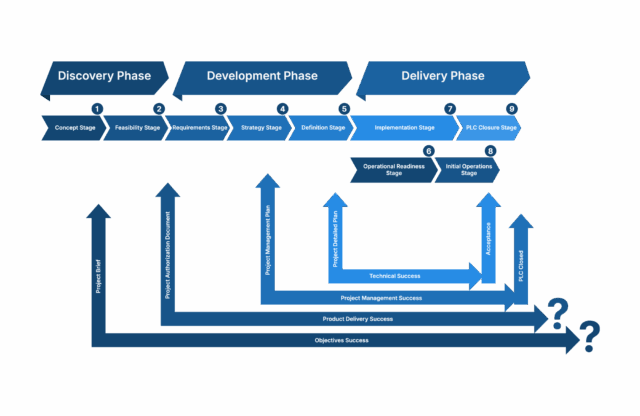A strategic, integrated approach that aligns governance, execution, and value creation.
The Uruk Framework is built on the pillars of success, integrating people (competence), with processes (and methods), and tools (technology). It is an alternative approach to widespread practices that views projects as technical work or limited to managing tasks or a piece of the project.
The Uruk Framework has five products, four of which are related to the Uruk proprietary Value Delivery Methodology. Along with the methodology, we support it with a unique project success model, a fresh perspectives on project control and performance management. The Uruk Framework is to predetermine, cultivate, and achieve project and organizational success!

The Seven Elements of Project Management Maturity
It has been proven, through numerous studies, that organizations with a higher level of project management maturity achieve significant performance gains and improved results versus those with lower levels of maturity.
The question is how to build the organization’s project management maturity, which is a direct contributor to organizational success.
The Uruk Framework includes the Seven Elements of Project Management Maturity. This model is not an assessment model. Rather, it is a model to help organizations transform their project management practice and build their competence and maturity, one element at a time.
It starts with the strategic and organizational aspects and includes other elements integrating people, processes, and tools.
The Value Delivery Methodology
At the heart of the Uruk Framework is value delivery methodology.
We have been building and enhancing this methodological process since 2007. It is a dynamic, scalable, and flexible framework that ensures project success from concept to closure.
Unlike rigid, one-size-fits-all approaches, or models limited to technical project management or task management; we designed this methodology with two essential principles.
The first is essential to integrating strategy, governance, product management, and operational readiness into a seamless lifecycle. A life cycle that integrates project management with the rest of the organization helping break or minimize the effect of silos and inefficiencies in the interfaces. As a result, the Value Delivery Lifecycle covers a project from ideation to initial operations and success.
The second principle is about understanding and respecting the diversity of practice. We realize that project management is a niche across all types of verticals. Therefore, there are similarities and differences. To respect the diversity of practice, it is essential to depend on customizing the methods to a given vertical and adapting them to fit the type and context of a project. Accordingly, the second principles require developing bespoke tailored methods that are fit for purpose.
This methodology and tailored methods serve as the core foundation of project management elements within the Uruk Platform, enabling teams to:
- Adapt execution strategies to fit different industries and complexities.
- Scale project management processes across organizations of any size.
- Ensure structured decision-making from feasibility to final delivery.
It has been proven that following a similar approach leads to significant performance gains; including increasing the speed to market and doubling the chance of achieving the project objectives!
The Four Dimensions of Project Success
Achieving true project success goes far beyond meeting deadlines or staying within budget. It requires a fundamental shift in how success is defined, designed, and delivered. Too often, projects are labeled as failures without clarity, was it poor execution, lack of adoption, or misalignment with business goals? The Uruk Framework addresses this ambiguity with a structured, systems-thinking model that creates a shared vocabulary for project managers, PMO leaders, executives, and business sponsors alike.
Rooted in our Value Delivery Methodology, the Four Dimensions of Project Success offer a comprehensive, organization-wide lens to predetermine, cultivate, and assess value at every level. This approach emphasizes designing success from the outset through robust feasibility studies and business cases, rather than relying solely on retrospective evaluations.
Our model is not just a diagnostic tool for measuring outcomes; it is a proactive framework for identifying systemic challenges across governance, operations, and support. It helps organizations foster integrated ownership of outcomes and move beyond legacy delivery mindsets toward enabling the right culture, structure, and authority for success.
The Four Dimensions are ultimately a strategic guide for value-oriented transformation, helping leaders build not just better projects, but better environments in which projects can thrive.
The Four Control Reference Points
It is a widespread practice where project managers often focus on executing and the delivery phase of a project. The challenges with this approach are numerous:
- It ignores the early stages (the front end of the project life cycle). These early stages are critical for success and minimize risks and failures. It aligns with the concept of “think slow – act fast.”
- It limits control to the delivery phase, where the baselines have already been established. These baselines can help with quantitative project control. However, in the early stages, we can also include qualitative control to increase the chance of success.
- Finally, many practitioners miss the idea that control must start as soon as possible, once we have an approved business case and it should not stop until the team is ready to close.
Project Control is a project navigation system and must be ongoing from take-off to landing! It cannot be part-time or only when cruising.

The Six Steps of Performance Management
Ensuring project success requires more than just tracking milestones, it demands continuous performance evaluation and proactive decision-making.
The Uruk Framework introduces a structured Six-Step Performance Management Framework, designed to provide real-time insights, maintain accurate and timely forecasts, and optimize execution at every stage.
Timely and accurate performance assessment and forecasting are vital parts of the ongoing feedback system that can give the team early warnings to respond quickly. An effective system can also help the team be proactive and minimize issues, problems, and risks.
While this approach is fully aligned with the Value Delivery Methodology, it is flexible and applicable to any project management framework.
The Uruk Framework six-step model is essential for effective project management!




